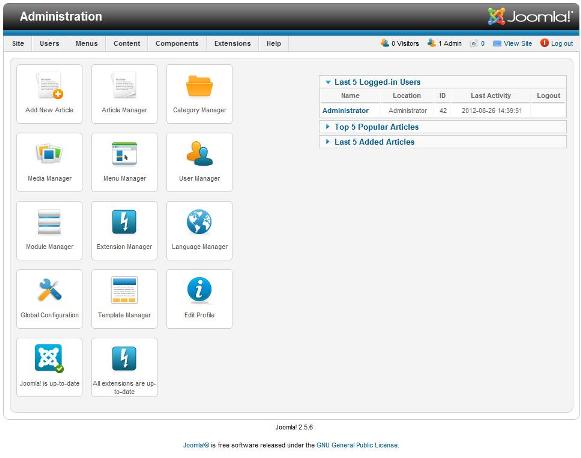Choosing Joomla verses WordPress as a framework should be a matter of practicality as the website themes can look equally professional.
The back office user interface is similar. WordPress is more web theme centric whilst Joomla is built upon a CMS framework and is more generic module, extension centric.
There is a learning curve involved with becoming familiar with both back office frameworks.
WordPress is natively configured primarily as a powerful website blog framework, is more suited to the less experienced website developer with more intuitive back office plugins and has become the framework of choice for small business websites.
Joomla’s powerful CMS framework is more suited to custom scalable membership, corporate and e-commerce sites.
readmore
Joomla Templates vs WordPress Templates:
At first glance there seems to be more WordPress themes available than Joomla templates.
It’s worth spending a small amount for themes and templates because these generally come with more complete frameworks, easier editing options, better documentation and online support.
My choice for a first Joomla site is the Joomlage.com Joomlage0054 – Multiplex template which from a quality and user developer prospective is similar to my WordPress elegant themes professional template. The back office user code information and support are equally as good.
The initial theme/template installs are different in that WordPress comes with content which is installed from an imported XML file. Column layouts are pre-configured and are easily managed with page enabled features and drop down selections. The sample content is then replaced with your own content.
Joomla with its CMS framework has a list based framework where modules, extensions and page layout objects can be selected and published from common back office page lists. There is no pre configured template theme with configured content. Content modules are enabled via a template extension content list.
This makes it easier to move website content between different template formats and is more flexible. The down side to this is that there is more back office module management knowledge required for configuring a new website to look similar to the demo site.
When multiple Joomla templates are installed the back office is filled with generic looking modules within the module manager page listing which have to be located and configured to work correctly with the appropriate template.
I found that I had web pages from a number of different templates that could be opened from the menu buttons while I was working on setting up my current theme.
Joomla templates come with an install guide pdf and module positions pgn file. The install download file has to be unzipped to a local disc where the folder zipped template extension and module files can be located and uploaded using the Joomla back office Extension Manager.
Joomlage.com templates come with an easy to follow Joomla framework and site install guide. Hosting sites that include Joomla support include an easy to follow domain folder framework install process that includes sample templates.
Why move from WordPress to Joomla?
Joomla is a mainstream framework with an embedded content management system (CMS) which is used for corporate websites, online magazines, newspapers, e-commerce sites, online reservations and Government applications.
Joomla articles are perceived to be written by professions which more easily translates into branding exclusivity, authority and quality.
There is a perception that a higher technical skill set is required for Joomla website development whereas WordPress is more accessible as an entry level framework with free plugins.
An example of this is website statistics which is very important for monitoring webpage visitors. Slimstat is a free WordPress plugin and provides very comprehensive statistics, whereas similar comprehensive Joomla statistics is only available through a module extension service for a monthly fee.
This issue can be resolved by finding a website hosting service that also provides high quality free website statistics.
Configuration:
Joomla’s CMS framework simplifies user access with multiple permission levels for memberships and e-commerce payments. The coding structure is more efficient making scaling more manageable without impacting website performance.
While CMS plugins are available for WordPress performance and compatibility can quickly become an issue. Third party plugins slow down webpage and back office refresh rates causing user performance slowdowns that can quickly affect visitor traffic.
Convenience:
Joomla’s CMS framework makes it easier for guests to submit articles and to have them reviewed and managed by an assigned non technical back office reviewer.
Memberships and membership payments can be easily manage by non technical back office administrators.
Technical Skills:
The coding/scripting and webmaster skill sets are very similar for Joomla and WordPress.
A moderate understanding of ftp, http, html, css, java script and php is advisable.
However these modern powerful frameworks are designed to be easily managed. While the underlying code is quite complex it’s unnecessary to be a coding guru or IT expert to develop and manage these websites.
Conclusions:
Moving to Joomla is a natural progression from WordPress as more flexibility and scalability becomes a requirement.
There is obviously a learning curve going from developing a simple html landing page template using html, css scripts to developing a WordPress blogging site, the initial learning curve (or cost) for Joomla is slightly higher.
It may be more difficult to find the right customizable template for Joomla and take longer to initially develop however it will likely prove to be a more successful business framework over the longer term.
Update:
I was just reading a sitepoint WordPress vs Joomla Introduction where they highlight WordPress as a being the number one distributed CMS framework and I just wanted to clarify what I see as an area of confusion.
WordPress is what I call a “packaged” CMS framework environment optimized for a blog post website format. Consequently there are areas where it does not perform as well as the Joomla CMS framework which is more flexible and scalable and is better suited for back office management of multi-level services and payment systems.
I consider Joomla to be a mainstream CMS framework.
Also in terms of domain hosting, bandwidth and database size limitations is more of an issue than if a windows or Linux service is being used. Linux generally provides a simpler more reliable hosting framework. However some Linux hosting providers may also be limited in their support for importing and exporting Joomla and WordPress SQL databases.
Therefore unlimited bandwidth and database size hosting is a prerequisite for high quality/performance websites.
Enjoy!
Mark.
PS: Don’t forget to visit my Products pages for premium WordPress themes and Joomla live demo site templates!
Background Info:
This post is based on personal experience resulting from an attempt to convert this WordPress subscriber blog to a CMS article submission membership site. Technical problems were found with the conversion and hosting resources. http://www.social-say.com is a Joomla site currently under initial construction as membership article submission site.





![Validate my RSS feed [Valid RSS]](http://mark-jago.com/wp-content/uploads/2011/11/Validrss.gif)
